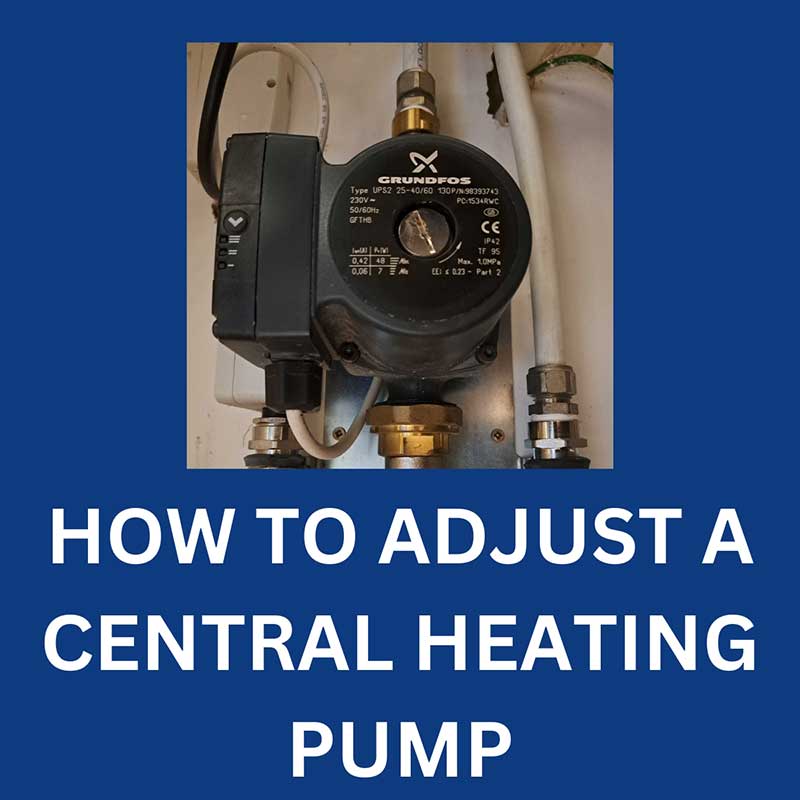
Boiler-powered central heating systems are fitted in many homes throughout the UK. They heat hot water and circulate it around the home through pipes and radiators.
The pump speed is important for optimising the efficiency of your heating system.
An adequately set pump speed will ensure optimal energy efficiency and heating. Unfortunately, many pumps are incorrectly set when working on central heating systems.
This article will provide a step-by-step guide on setting your central heating pump (AKA Water Pumps & Circulating Pumps) speed for optimal performance.
Why Pump Speed Is Important
The central heating pump speed controls the rate at which the pump circulates hot water through your heating system. Therefore, the pump speed must be set correctly.
If the pump is set too high: Water will circulate too quickly, which can cause Boiler issues. The pump will consume more energy, cost more to run, wear out quicker, and need replacing more often. The pump and central heating pipes will also be noisy.
If the pump is set too low: The water won’t circulate fast enough and provide insufficient heating, which can cause the Boiler to overheat and switch off.
So it’s important to set the pump correctly and have your central heating system ‘balanced.’
Why Pumps Have Different Speeds
Central heating systems differ from home to home, with different sizes and types of Boilers, varying amounts of radiators, different pipe diameters etc.
The above factors, along with the system’s overall size, determine the optimal pump speed.
Pumps have different speeds, so they can be set with the power to match the central heating system they are fitted to.
Pumps generally have three speeds, low, medium and high. They are adjusted by moving a dial, switch or pressing a button.
If there is no option to adjust the speed of your central heating pump, then it’s likely a single-speed model. However, you may need to change it to a variable speed model if it’s too weak or too powerful for your system, and you will likely need to consult a heating engineer.
What Type Of Boiler & Central Heating System Do You Have?
To start, you need to establish what type of Boiler and central heating system you have. It will be one of the three listed below.
- Combination Boiler: No water cylinder, water tanks or pump
- System Boiler: Includes a water cylinder and a pump but no water tanks
- Regular Boiler: Includes a water cylinder, a pump and water tanks
If you have a Combination Boiler, the pump is located inside the Boiler, so call a qualified heating engineer if you have pump trouble.
If you have a System or Regular Boiler, read on.
When to Adjust Pump Speed
It’s worth adjusting the pump when experiencing these issues with your central heating system.
- Radiators don’t get hot
- The pump and/or pipes are unusually noisy
Finding the Central Heating Pump
The first step in setting your central heating pump speed is locating the pump.
The pump is usually located near your Boiler or the water cylinder. It’s cylinder-shaped with two connecting pipes and will include an electrical cable.
What To Do
What you need to do depends on if the pump is set to low, which will result in the radiators not getting hot and/or the Boiler switching off frequently.
If your pump is set too high, it will result in excessive noise from the pump or central heating system. You also may find that radiators need bleeding regularly too.
The Pump Is Set Too Low
First, make sure all your radiators are bled, find the pump and adjust the speed. Then, switch your heating on and check the radiators. After about an hour, they should now be hot.
If not, adjust the pump up (if you’re not yet on the top speed). Then, recheck the radiators in one hour.
If your radiators are still not getting hot, you may have a faulty pump (see below) or another issue with your central heating system.
The Pump Is Set Too High
If your pump is set too high, take note of the current pump and central heating system noise levels, find the pump and turn down a level (if the pump is not already set to the lowest setting).
Switch on your heating. The pump should now be quieter, and so should your central heating system. Make sure your radiators are still getting hot.
If adjusting down doesn’t work, switch the pump down to another level (if possible) to ensure your radiators are still getting hot.
If the pump is set to the lowest level and you feel it’s still too noisy, then there may be an issue with the pump itself, and it may need replacing by a heating engineer.
Still Can’t Solve Your Pump Issues?
We hope the above procedures help you optimise your central heating system.
If you’re still experiencing issues with your pump and live in the county of Essex, one of our engineers can look at it for you. Please contact us to book an appointment.
0% Finance
For Boiler Installations & Repair
